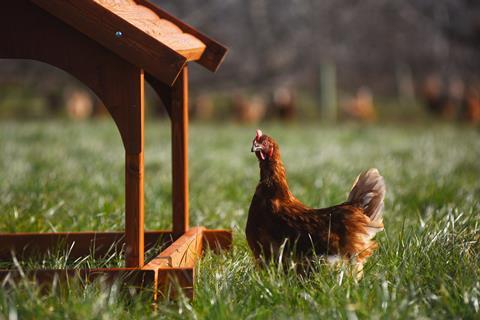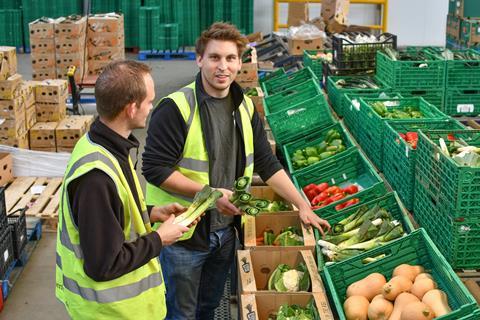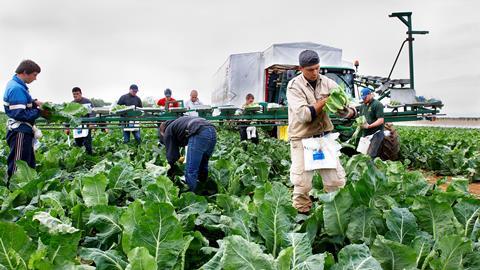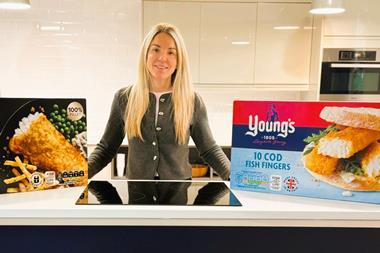It’s not just seasonal labour. Britain’s farmers are concerned Brexit could lead to a shortage of senior management in their businesses. Could apprentices provide a long-term solution?
Across the south coast of England, in lush fields in Hampshire and West Sussex, one of the most famous names in British farming harvests over 35 million cobs of sweetcorn a year.
Barfoots has come a long way since fifth-generation farmer Peter Barfoot grew a single crop in the unique micro-climate of the Hampshire basin. The business now grows, processes and packs a wide range of semi-exotic vegetables from over 7,000 acres of farmland in the UK and sites from Spain to Senegal.
It is a modern business for a modern food supply chain, and is just one of thousands of farmers expected to take the strain and keep Britain’s food supply flowing assuming it departs the EU. And the stakes have never been higher for the domestic farming industry to step up production: the Global Food Security programme states Britain imports as much as 48% of all the unprocessed food it consumes.
But among the short-term worries about disrupted trade flows, delayed plant health checks and seasonal labour shortages in the event of a no-deal Brexit, owners of businesses like Barfoots are increasingly concerned about how they will recruit the managers, agronomists, technologists and engineers of tomorrow to hit these ambitious goals. Although the government has now confirmed that, in the event of a no-deal, it will allow employers to recruit EU nationals both seasonally and permanently for 14 months from 31 October, this measure is only temporary.
Labour
A briefing paper for MPs in 2016 estimated that some 27,000 non-British EU nationals held permanent jobs in UK agriculture, a figure that excludes seasonal and temporary staff, and the EU is a logical source of labour for an industry that typically struggles to attract domestic employees.
“We have a cohort of colleagues who have joined the business from around the EU over the last 15 or more years,” explains Julian Marks, Barfoots MD.
“They have progressed through the business and a significant number now hold senior roles throughout a variety of disciplines.”
Many of these staff were originally employed in technical or quality control roles that give them a detailed understanding of the company’s products, he says, which has served them well as they moved into more senior roles in buying, technical, food safety and other areas.
“But we are already seeing changing flows of people from different regions as not only the implications of Brexit bite, but also the economic cycles in their home countries improve and they return to support their own economies.”
Marks is by no means alone in his assessment. G’s Group, which has a turnover approaching £500m, is one of the farming industry’s biggest recruiters, taking on more than 4,000 staff in a variety of production roles over the course of the year.
“Brexit has added a level of complexity, which is resulting in a shortfall in calibre and availability of applicants”
G’s supplies all the major retailers, as well as processors, foodservice and the wholesale market with a wide range of vegetable and salad lines, and has been vocal in expressing the challenges facing fresh produce recruiters in the current environment.
HR director Beverly Dixon says a reduction in EU nationals coming to Britain - already a huge headache for a business that hires vast numbers of seasonal pickers and packers - is also causing a knock-on effect at more senior levels.
“Brexit has added a level of complexity, such as the negative press in workers’ home countries and adverse exchange rates, which, coupled with extremely low unemployment rates across Europe, is resulting in a shortfall in calibre and availability of applicants,” she points out.
It’s a story you hear again and again across the farming sector. Andrew Fitzmaurice, MD of recruitment specialist MorePeople, which places staff across the fresh food, horticulture and agriculture supply chains, says he has seen numerous success stories of migrants who have started on the bottom rung of the ladder in their respective businesses and worked their way into management positions. “While it’s only one source of talent, it is one that, if lessened, only serves to heighten the shortage of good candidates,” he adds.
According to Office for National Statistics data, there are an estimated 2.37 million EU nationals working in the UK, but net EU immigration has fallen steadily since the referendum in 2016 and is now at its lowest level for six years. Crucially, there has been a fall in immigration for work purposes, which is now at less than half the level it was at its peak in the year to June 2016.
Noble calls for farming to be showcased in schools

Major egg supplier Noble Foods says the impact of Brexit will be felt “far and wide”, particularly at team leader and farm management level, but believes targeting schoolchildren is key to the long-term solution.
“At school, children are not made aware of the legion of opportunities that exist within the agricultural industry,” explains group HR director Louisa Hogarty. “It should be included within STEM to spark interest and make it an acceptable career choice.
“Roles within farming can be very lucrative as we move to more technical, scientific and automated systems, and our children just don’t know such roles exist.”
Hogarty adds that the days when farming was seen as a “dirty, low-paying job” are long gone, and nowadays scientific advancements and sophisticated management systems merge to offer well-paying opportunities.
“We need to do more to ensure this becomes mainstream as part of discussions within the education system.”
Apprenticeships
So what to do? One mooted solution to farming’s long-term staffing problem is apprenticeships.
Proactive businesses are increasingly seeing the opportunity for on-the-job training as a way of both attracting and retaining local talent, particularly at a time when unemployment is under 4% and competition for quality staff is fierce. “Apprenticeships offer a great way to attract new talent to enter the farming industry, following a structured and professional career pathway and learning,” says Nicky Taylor, head of talent and employee experience at poultry giant Moy Park. “More and more, people are recognising the benefits of apprenticeships as a great way to start their career.”
On the face of it, the Apprenticeship Levy is ideally placed to help. The oft-maligned government initiative, introduced in April 2017, compels employers with a wage bill of over £3m to pay into a fund that can then be accessed for use in apprenticeship training and assessment.
In June, then-home secretary Sajid Javid pledged to broaden the Apprenticeship Levy into a wider skills levy, giving employers the flexibility they need to train their workforce while ensuring they continue to back apprenticeships, and the farming industry will be keen to see that the promises are delivered.
“Apprenticeships offer a great way to attract new talent into the farming industry”
Change is certainly due. While the Apprenticeship Levy has provided a new, ring-fenced way for employers to train and attract staff, it has not been without its problems and most farming businesses will tell you it needs to evolve to be fit for purpose.
Dixon believes the levy in its current form is restrictive and has diverted spend away from clear training needs to the requirement to learn using a formal apprenticeship qualification. Most frustratingly, she adds that a significant proportion of the levy will go unused due to “the impossible volume of activity that it would demand in addition to the other business training needs being identified”.
The level of complexity and volume of paperwork required is regularly cited by HR managers as another black mark against the Apprenticeship Levy. This comes alongside criticism that the scheme is inflexible when it comes to encompassing the needs of the seasonal and returning staff that are a key feature of the farming sector.
Many farms contacted by The Grocer complained there was a lack of support and guidance when the scheme was set up - though there is a feeling that companies are getting to grips with the nuances of the initiative, and are now starting to use their levy pot to train more employees. Morrisons, for example, has made a strong statement by ringfencing a chunk of its Apprenticeship Levy cash and making it available to fresh food suppliers to help train the farmers of the future (see box, above).
The levy exists alongside both current and new initiatives being taken by industry to attract new staff. Groceries Code Adjudicator Christine Tacon is also chair of Management Development Services (MDS) - a scheme set up to train the next generation of fresh produce industry managers across a wide range of occupations.
The scheme has been operating for 30 years, and was converted into a Level 5 Leadership & Management apprenticeship scheme a year ago, with the additional benefit of allowing MDS members to put their own staff through the programme using their Apprenticeship Levy cash.
Attracting talent
Tacon says that while there is not necessarily a shortage of people wanting to work in management, the farming industry does have to work hard to attract them - and one of the features of MDS is that it draws in applicants with a wider range of experiences than one might expect to come into farming. “We have trainees with degrees ranging from archaeology to chemistry, languages to farm business as well as the occasional PhD in plant science,” she explains.
“We have trainees with degrees ranging from archaeology to chemistry, languages to farm business”
“The trainees value the fact they will get two years of work experience in four different businesses doing four different jobs, while also being trained. What nearly all our trainees have in common is that they aren’t sure what they want to do in their career: MDS shows them some options and once they have got to know our industry, they rarely leave.”
Staff retention
Many businesses are increasingly setting up their own schemes to attract employees too, and there’s a tangible sense that a focus on staff welfare and motivation could play an important role in retention.
Organic vegetable box supplier Riverford moved to an employee ownership model last year. The switch was part of a wide staff-centric strategy that included hiring Joanne Wheatley as its first head of people development.
Wheatley has set up two in-house apprenticeships - a Level 3 team leader Chartered Management Institute apprenticeship and a Level 2 in improving business techniques. Some 28 staff - or co-owners as they are now referred to at Riverford - are set to take the Level 3 course this year. There are also plans to offer a Level 5 in the new year, which should tempt middle managers to join and develop skills such as operational and project management, finance, leadership, self-awareness and decision making.
For a company that has traditionally faced challenges finding staff - a food and farming outfit in Devon is never going to be inundated with applicants - Wheatley points out one of the most striking aspects of the scheme: not a single person who has taken any of the apprenticeship courses has left the business. “In production you tend to get higher levels of staff turnover than in other organisations, so it’s a stark difference to what we might expect,” she says. Two of the Level 3 apprentices have received “significant” promotions, with others also benefiting from the extra visibility within the company that taking part gives them.
Many farm businesses are just starting out on their apprenticeship journey, tentatively navigating the pathway through what they hope will ultimately become a more effective and straightforward Apprenticeship Levy. As Britain’s EU exit and staffing headaches multiply, apprentices may just provide the injection of new talent to ensure the industry is fit and ready to meet the complex needs of the new era.
Morrisons seeks farmers of tomorrow

Supermarkets are increasingly looking to shorten their supply chains and source more fresh food direct, and Morrisons has reinforced that link by launching a £2m apprenticeship fund aimed at training the farmers of the future.
The retailer, which has long touted its close relationship to farmers, said the move to allocate up to 25% of its Apprenticeship Levy pot to supply chain employers came after a report from The Prince’s Countryside Fund revealed that the average age of farmers is 59 and only 3% of them are under 35. What’s more, some 70% of farmers believe not enough young people are coming into the industry.
Farmers in Morrisons’ supply chain can apply for funding to cover the cost of apprenticeship training for their staff.
Young people interested in a career in farming can also join the scheme directly and will receive broad-based agricultural skills training from a recognised training provider, mentoring and support from fellow apprentices and key members of the Morrisons team, as well as having the chance to spend time in store to understand customers’ attitudes to British sourcing, farming and animal welfare.
There are also sector-specific elements, including a UK first kicking off in 2020 whereby apprentices who are already working on a farm producing eggs from laying hens are able to join Morrisons’ bespoke egg training scheme, which has a targeted programme for working in the sector in association with Bishop Burton College and industry partners.
Ultimately the apprentices can earn a Level 2 or 3 apprenticeship qualification taken through a combination of training at their local college and their work with the supermarket.
Morrisons’ chief executive David Potts said he hoped people from all backgrounds would be attracted to the scheme and help secure the nation’s future food supply. “We are British farming’s single largest customer,” he said. “So it makes sense to invest our apprenticeship fund to contribute to more new farmers being skilled to provide food for the nation.”
The initiative also received the backing of farming bodies, with National Farmers Union president Minette Batters stating: “Improving skills is a key part to unlocking productivity gains on farm and vital in addressing the future challenges and pressures that farming faces.”




















No comments yet